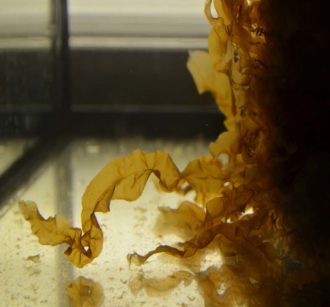As a sea vegetable, kelp may help Northeast acquaculturists diversify their businesses and contribute to this multibillion-dollar industry. Charlotte Quigley, a PhD student at the University of Maine, used her Northeast SARE Graduate Student grant to study Alaria esculenta, a kelp that is of interest to U.S. growers due to its market potential, nutritious and palatable characteristics, low iodine content, and ability to be used in a variety of cooking applications.
Because coastal sea surface temperatures are predicted to increase, Charlotte was particularly interested in testing the kelp’s tolerance to temperature fluctuations. She examined the physiological responses of A. esculenta seedstocks and found that they are capable of adapting to warming water. As a result, researchers now have a better understanding of the temperature tolerance of A. esculenta grown in the Gulf of Maine. Charlotte predicts that kelp may be a viable candidate for sea vegetable aquaculture now and into the future.
View Related SARE Grant:
- Genetic comparisons of temperature tolerances of a candidate sea vegetable crop, Alaria esculenta (GNE14-074)
